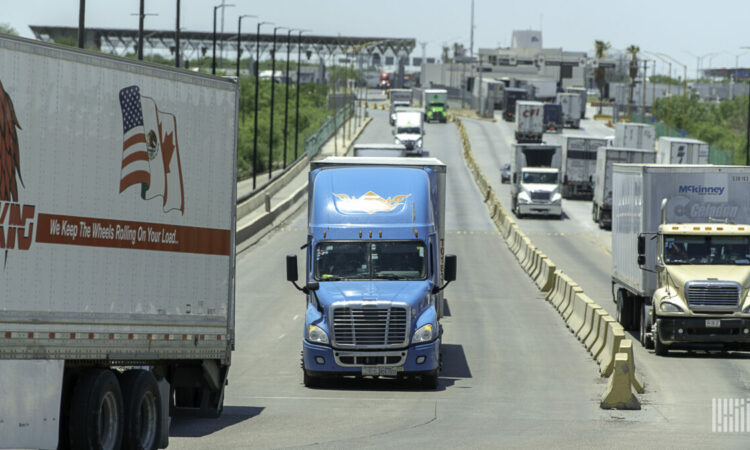Borderlands is a weekly rundown of developments in the world of U.S.-Mexico cross-border trucking and trade. This week: Xcell Logistics sees big opportunities with cross-border trade; BMW to invest around $800M in Mexico in EV push; sensor-maker announces new factory in Mexico; and Careismatic Brands moves into major distribution hub in Dallas.
Xcell Logistics sees big opportunities with cross-border trade
With the increasing demand for nearshoring manufacturing into Mexico, Xcell Logistics Services recently opened a second warehouse in Laredo, Texas.
The additional logistics space will help service the growing inbound and outbound flow of freight crossing the U.S.-Mexico border, Xcell officials said.
“Nearshoring is already here. It’s not around the corner, It’s already here,” Xcell CEO Cedric Sosa told FreightWaves. “All these companies are moving from Asia to Mexico. That trade is just going to keep growing, not just in Laredo, but all the ports of entry along the border.”
Founded in 1992, Xcell Logistics Services offers integrated customs brokerage and international air and ocean services as well as truckload, less-than-truckland and flatbed trucking solutions throughout the U.S., Canada and Mexico.
Xcell has eight offices, including locations in Laredo and the Mexican cities of Guadalajara, Monterrey, Nuevo Laredo, Manzanillo, Lazaro Cardenas and Veracruz. The company is headquartered in Mexico City.
The recently opened second warehouse in Laredo is located at 502 Nafta Boulevard, less than a mile from Xcell’s other facility at 814 Union Pacific Boulevard. Sosa said the need for a second warehouse location in Laredo arose because of growing customer demand.
“Cross-border trade keeps growing, [and] Laredo is the biggest port of entry for Mexico in the U.S., with around 12,000 to 15,000 trucks crossing the border every day,” Sosa said. “Normally, with cross-border operations, the cargo gets in, then it gets out. We really don’t warehouse it for a lot of time, but it’s been growing. We couldn’t fit it in our [existing] 50,000-square-foot facility, so we leased out a new facility, which is 77,000 square feet.”
Sosa said Xcell expects the second location to be at capacity by the end of the first quarter and could possibly look into constructing a third warehouse in Laredo in the near future.
The company was recently acquired by Dallas-based B.I.G. Logistics, a 3PL and technology-enabled warehouse management IT platform with warehouses throughout Texas, including near the Fort Worth Alliance Airport and Dallas/Fort Worth International Airport and in El Paso. B.I.G. also has offices in Huntsville, Alabama, and Houston.
Steve Russell, CEO of SecurCapital, B.I.G.’s parent company, said there also are plans to open a new logistics operation in Santa Teresa, New Mexico. Russell said the synergy between Xcell and B.I.G. will allow them to give cross-border shippers a wider range of services.
“‘I’ve been in freight for 35 years, and we decided to focus as a core strategy for our investment in the border, about two or three years ago, Mexico and including the Canadian border in Toronto and Vancouver,” Russell said.
Prior to SecurCapital, Russell served as CEO-Asia Pacific for Salesforce in China, where he witnessed the migration of manufacturers from Asia to North America.
“While I was at Salesforce, I could see the migration from China,” he said. “First, it was Foxconn, from Taiwan to China to Mexico, across the border from Santa Teresa.”
Foxconn, a Taiwan-based global manufacturer of electronic products for companies like Apple, opened a plant in San Jeronimo, Mexico, across from Santa Teresa, in 2008. Foxconn now boasts five factories in Mexico, including locations in Tijuana and Ciudad Juarez.
“The signs were there that things were going to be nearshored even before COVID, before the tariffs between China and the U.S., that in manufacturing there was going to be a paradigm shift in the next 10 years,” Russell said.
Some of the latest news about the nearshoring to Mexico trend came in a recent FreightWaves report that indicated Texas has been more resilient for outbound trucking loads than California, which has seen a steeper decline over the last several years.
According to Zach Strickland, FreightWaves’ head of market intelligence, tender volumes for loads originating in Texas are 42% higher than in late January 2019. California freight demand is 17% below where it was three years ago before the pandemic started.
Strickland said the reasons include nearshoring to Mexico, as well as “shifting of imports to the U.S. East Coast that occurred this past year due to the port congestion created during COVID.”


